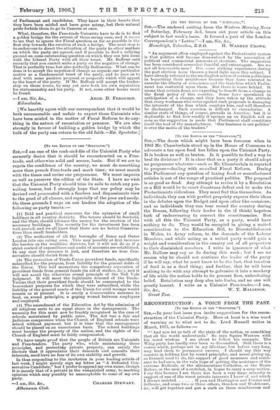[To THE EDITOR OP THE "SPECTATOR. "] SIR, — I am one of
the rank-and-file of the Unionist Party who earnestly desire that it should be reconstructed on a. Free- trade, and otherwise solid and secure, basis. But if we are to regain the confidence of the country, we must do something more than preach Free-trade and mark time; we must march with the times and revise our programme. We must improve as well as preserve the edifice of the State. I have no wish that the Unionist Party should trim its sails to catch any pre- vailing breeze, but I strongly hope that our policy may be devised and prosecuted with a fearless and dispassionate view to the good of all classes, and especially of the poor and needy. On these grounds I urge on our leaders the adoption of the
following as party tenets :-
(1) Bold and practical measures for the extension of small holdings in all country districts. The tenure should be freehold, and the State should advance the money for the erection of the necessary buildings. The security for the investment has been well proved, and we all know that there are no better Conserva- tives than small freeholders.
(2) The unification of all the boroughs of Inner and Outer London into one rating area. This may possibly at first increase the burden on the wealthier districts, but it will not do so if a strict control of expenditure and audit of accounts are established. In any case the measure is just, and therefore no true Con- servative should shrink from it.
(3) The protection of Trade-Union provident funds, specifically subscribed for the purpose, from liability for the general debts of the Union. This will necessitate the compulsory separation of provident funds from general funds (in aid of strikes, &c.), and it will not assail the otherwise sound principle of the Taff Vale judgment. It will meet the legitimate demand of the Trade- Unions that their provident funds should be consecrated to the benevolent purposes for which they were subscribed, while the liability of the general assets of the Union for civil wrongs would remain as at present. It is surely a Conservative measure to heal, on sound principles, a gaping wound' between employers and employed.
(4) The amendment of the Education Act by the admission of all religious sects to an equal share in the management. The necessity for this must now be frankly recognised in the case of schools maintained by public rates. The Act was a fair and judicious compromise when the Church of England schools were seized without payment, but it is time that the management should be placed on an unsectarian basis. The school buildings must become the property of the nation, and the rights of the Church of England must be fairly compensated.
We have ample proof that the people of Britain are Unionists and Free-traders. The party who, while maintaining those principles, and protecting private property, can satisfy the electors that it appreciates their demands and consults their interests, need have no fear of its own stability and growth.
In thus responding to the invitation in your leading article of last week, I might merely sign my letter as "A Defeated Con- servative Candidate," but I prefer to append my own name, though it is merely that of a private in the vanquished army, to masking opinions which may possibly be unacceptable to some of my own party.
itth,enwum Club. [To TSB Herron OP VIE "SrECTATOli." J SIR,—The enclosed cutting from the Western Morning New of Saturday, February 3rd, bears out your article on this subject in last week's issue. It formed a part of the London Correspondent's "Letter."—I am, Sir, &c., Homeleigh, Yelverton, R.S.O. H. WARREN CROWE.
" Au argument often employed against the Protectionist system is that politics will become demoralised by the association of political and commercial interests at elections. The suggestion has been considered somewhat fanciful and extravagant. Are we not all honourable men ? But some striking experiences during the past election have thrown a lurid light upon this subject. I have already referred to the un-English action of certain politicians in boycotting their neighbours because they have ventured to exercise the liberty of conscience and the franchise which Parlia- ment has conferred upon them. But there is worse behind. It seems that certain firms are expecting to benefit from a change in the fiscal policy of this country. Some have speculated in anticipation of a change, and they have taken up the attitude that every workman who votes against such proposals is damaging the interests of the firm which employs him, and will therefore be discharged. Such coercion is difficult to characterise. A similar state of things, of course, prevails in America ; but it is deplorable to find how readily it springs up on English soil as soon as the suggestion is made that Parliament shall constitute itself the tool of the manufacturer. ` Our business is our politics' is ever the motto of the traders."










































 Previous page
Previous page